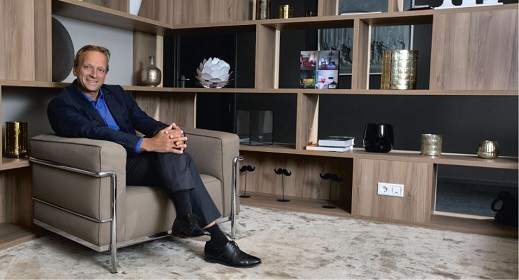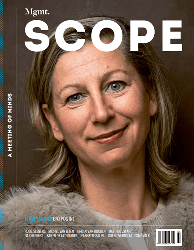'An evolutionary process that lasts for years'

21-03-2019 | Interviewer: Stef Oud | Beeld: Maartje Geels
Digital transformation has been a fact in the world of fixed and mobile Internet for years. One of the bigger players, Liberty Global, has interests in ten European countries. In the Netherlands Liberty Global is known as the parent company of UPC, later Ziggo, and now as the merger partner of the new combination VodafoneZiggo. One of the faces of the company is Manuel Kohnstamm, originally a lawyer and political scientist. Kohnstamm started his career at the European Commission, where he investigated the telecommunications market, among other things. This was at the end of the 1980s, the formation of the internal market being in full swing. In 1992 he joined the American media company Time Warner: Kohnstamm was asked to defend the interests of this group in Europe. In 1999 UPC asked him to become a lobbyist in Brussels. There Kohnstamm first concentrated ‘purely on European rules’, but later he also held positions within UPC in the field of commerce and external relations.
In 2005 UPC was acquired by Liberty Global, founded by the American billionaire and ‘Cable Guy’ John Malone. In 2015, Liberty acquired Global Ziggo, as a result of which the UPC brand name disappeared. Last year, consolidation went one step further, with the merger of Vodafone and Ziggo. Within this joint venture, Vodafone and Liberty Global each own half of the shares of the new combination. The merger illustrates the growing importance of the integration of fixed and mobile Internet: more and more households are switching to an ‘all-in-one package’. Kohnstamm has experienced all these market changes from the inside. Since 2012 he has been Senior Vice President and Chief Corporate Affairs Officer of Liberty Global. We are talking to him at the European headquarters of Liberty Global at Schiphol-Rijk.
What does digital transformation mean for Liberty Global?
‘We were one of the first companies for which digitalization quickly gained concrete significance. At the beginning of this century, our customers had to switch from analogue to digital television. Many customers didn't like that, it was more expensive and they already had TV, didn’t they? It really took us ten years to convince consumers that digital had more potential and would eventually be unavoidable.
For ourselves, too, if we wanted to be future-proof, we really had to introduce digital TV actively. It was new for everyone, so the switch was not entirely flawless. I have to admit that we also made mistakes. For example, the distribution of digital set-top boxes in the Dutch market was too forced, the first versions were not yet good enough. The logistics behind them was shaky. That caused irritation among the customers.’
Did this digital transformation mean that you needed a different type of employee?
‘Certainly. At the time, about 80 percent of UPC’s employees were specialists and engineers who were familiar with the world of radio waves, of analogue electrical engineering. They were not familiar with IP addresses and data processing. So they had to do a lot of retraining. Compared to newcomers in our market, we had not only this “personnel legacy”, but also the equipment legacy. If you have millions of customers in various European countries and you have to switch to new standards and software systems − think of back office and invoicing systems − then it costs you an incredible amount of time and manpower. You enter an evolutionary process that lasts for years. In fact, since the late 1990s, UPC has been constantly working on digital transformation.’
What demands does this place on managers and employees?
‘An enormous, permanent willingness to adapt. Looking back, I can only conclude that the transformation that started in the 1990s has been an intense period. It requires a certain type of employee, one who feels at ease in this kind of changing environment.
Of course, the advantage we had was that we were in a growth market and the company was growing fast as a result. Even though it took a long time, customers eventually became very enthusiastic about broadband. In Dutch households, broadband has become an integral part of life. But of course, it is not very difficult to work in a sector that is only growing. On balance, you don't learn that much if you’ve only had the wind in your sails. In my opinion, a manager who comes to the surface in a growth market does not have to be a good manager yet. My experience is that you learn more from failure than from things that only go well.’
Liberty Global not only grew organically, but also through the necessary mergers and acquisitions?
‘Certainly. Since 2000, we have had between 230 and 240 transactions, and since 2010, I have been in contact with the relevant competition authorities. A huge number of transactions indeed, but in addition to a few large ones − such as the purchase of Unitymedia in Germany, the British Virgin Media, Ziggo in the Netherlands and BASE in Belgium − there were also many small ones. This automatically gave us a whole new range of new employees, sometimes with a radically different corporate culture. Take the Belgian Telenet, in which we have a majority interest. This is really an Internet company, which started with a licence to deliver Internet on the Belgian cable networks. Only when they had existed for a number of years did they buy the cable networks and start delivering television. They employ a lot of young people, who really brought an Internet culture with them. We also get impulses from other subsidiaries, so that we now have a very nice, international mix of employees here at our head office.’
When recruiting digital talents, does Liberty Global also take into account the fact that more and more millennials are choosing organisations based on their activities in the field of corporate social responsibility (CSR)?
‘Yes, we are trying to express our corporate social responsibility in many ways. For example, our employees help children with programming, on a voluntary basis. We do this as part of the CoderDoJo project. Children learn how to program, build websites, develop apps and more. The idea behind this project is that programming can be compared to learning an ordinary language: that too is much easier when you start at a young age. Our employees have worked on these projects in Poland, Ireland, Belgium and the Netherlands. I do have the impression that millennials take that into account when deciding whether or not to join us.’
All those new beads on the Liberty Global chain are each in a specific phase of transformation. Did they all have to and should they all change over to your platforms and systems, or can they hold on to their own digital situation?
‘A lot of management philosophies have been applied to that, and by no means were they all successful. Stringing beads is partly done because of the synergy benefits. Our experience is that centralisation, particularly in the areas of purchasing, financing and capital structuring, is still extremely important and can generate a great deal of value. But the centralisation of IT systems across countries, which our structure has to deal with, is a completely different story. That's really a huge job. You try to let all those systems flow into each other smoothly, without customers noticing. But what remains at the end of the day is not a centralized system, but at most a central template with all kinds of networks switched on, with modifications and adaptations specific to each country. In practice, then, you end up with a decentralised system structure. This problem does not only apply to us, it applies to the entire sector.’
While at the back you are working on all these systems, at the front you are dealing with demanding consumers and a rapidly developing and digitalising market...
‘Yes, you’ll soon see different speeds and worlds. On the consumer side, we are leading the way, for example, with our Ziggo GO app. With it you can watch TV on your smartphone, tablet and laptop wherever you want. We are now also looking at possibilities for customers to arrange their own customer care via this kind of app, such as adjusting their subscription or following our technician’s app, so that you know exactly at what time he will be at your place to replace a cable modem, for example. Fortunately, waiting at home for half a day is no longer necessary. That gives both the customer and the technician peace of mind.’
What trends are dominating your markets now?
‘The shift from linear TV watching to watching where, how and when you want is, of course, extremely far-reaching. For many people, this has now become a normal part of how they interact with TV. This is also a major change for us, also in our relationships with broadcasters and streaming providers such as Netflix: we use the Netflix app on our MediaBox, just as we did with HBO before.
Another trend is that the customer's frame of reference is rapidly shifting. They quickly become used to an improved quality standard and are dissatisfied when something goes wrong, while hardly anyone knows that we have extremely good mobile networks in the Netherlands. Of the seven best networks worldwide, three are in the Netherlands! Only in Belgium and the Netherlands can customers choose from two very high-quality fixed networks. That’s not the case in any other country.’
What should be leading if you want to encourage digital development as an organisation: propagating a vision or working according to a master plan?
‘Working on the basis of a long-term plan is always difficult in a dynamic sector like ours. At the same time, this kind of plan keeps you somewhat in the middle of the road. Everyone knows where you want to go. Of course, vision is important, but personally I attach great value to the structure within a project organisation. This way you can clearly see when certain things have to be completed, who is responsible for what. This provides a basis for complex processes.
As an executive, you have to create an organisation in which people are not afraid to take responsibility themselves and to communicate openly, without any fear of making mistakes. If you start from a rigidly hierarchical structure, you get situations where employees hide mistakes from their boss. You have to create an environment of trust and clear responsibilities.’
Could you give an example of this kind of methodical project approach within Liberty Global that was proved to be the right one?
‘Take the implementation of the European privacy legislation GDPR, which entered into force at the end of May last year. Privacy is incredibly important to our customers, and we cannot afford to make mistakes. For us, it is a complex task because we are dealing with hundreds of different legacy systems, running on different platforms and technologies throughout Europe. Within all these systems, you have to ensure the same end result. Then you really need a very tight project organisation to be able to do that properly. Under my leadership, we have set up a separate organisation for this.
Did we succeed? We have amended the privacy conditions in all countries, built new processes to be able to respond in time to all customers who have made use of their new access rights. But this is a long-term project and requires intense cooperation and a common focus within the organization. Complying with the GDPR will remain a challenge for the future and is a high priority in our organisation.’
Interview: Stef Oud

